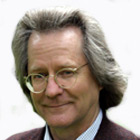*Roy Brown is immediate past president of IHEU and main IHEU representative, United Nations, Geneva.
Thank you, Dr Vijayam, the Gora family and the Atheist Centre for hosting this 7th World Atheist Conference: “The March of Atheism”, a conference which itself marks an important step on that march. But the path of Atheism has never been easy. I would like this morning to examine some of the reasons why.
Over the past hundred years, science has revealed the unimaginable vastness of the Universe. We now know that our planet is just a tiny speck in that vast expanse of the Cosmos, barely visible from the outer reaches of the Solar System, let alone from stars and galaxies a trillion times further away.
We also know that far from being formed complete and perfect, the object of divine creation, we humans are simply one species (well OK, a particularly versatile species) but only one species among the many millions of others that have evolved here on Earth by the blind, unguided process of evolution through natural selection.
In the light of that knowledge the idea that we humans are the ultimate and privileged product of a purposeful, divine creation can be seen as the purest fantasy. So why do so many people still cling to such beliefs?
Since Atheism is such a liberating, logically tenable, rational philosophy, why is the march of Atheism such a long, hard slog along such a difficult and rocky path? I want to suggest that there are four major obstacles on the path. And the first of these is …
Religion Whether we like it or not, many people find religion attractive. Every religion claims to have a monopoly of truth and a monopoly of virtue. Who among us, other things being equal and provided the personal cost is not too high, would not like to be considered both virtuous and endowed with knowledge of the truth? We like the splendour, the ritual, the music, the repetition and the comfort that religion provides. But more than that, we love the certainty that religion offers in an uncertain world. Seeking answers to life’s great questions is an important part of what makes us human – and religion supplies the answers. Above all, with its promises of reincarnation or an afterlife surrounded by angels, religion offers an attractive alternative to the bleak prospect of our mortality.
How can we compete? One problem we have in confronting the certainties of religion is that the transcendental really does exist. Don’t look so surprised! It exists in our imagination. Gods, fairies, unicorns, ghosts and angels may all be creatures of the imagination but we have no certain logical way of demonstrating that they are purely imaginary. The best we can do is to point out in the light of our newfound scientific knowledge the vanishingly small probability that the supernatural world really exists. But while we offer only probability, religion offers absolute certainty.
Now perhaps it would not matter that religion teaches nonsense (or perhaps, being charitable, I should say “that religion makes unsubstantiated claims”) if that nonsense was totally benign.
But scratch any religion and you find violence lurking just beneath the surface. Every successful religion has evolved memes for self-protection. Whether it is the promise of eternal damnation or the death penalty for apostasy, the promotion of faith over reason, or the demonization of science, these memes have helped sustain the hegemony of religion.
Finally, religion offers many people a purpose in life. Not everyone is capable of accepting the truth that we are all here by chance and that evolution gave us no other purpose in life than to reproduce. For Atheists, Rationalists and Humanists the purpose of life will always be what we choose to make it.
The second stumbling block in our path is …
Human nature None of us is entirely rational. However much we may wish we were guided purely by reason, we are all emotional creatures. We have evolved to be that way. We trust our emotions more than we trust reason. I know I do. And I know that I have frequently been guilty of using my reason to justify my gut reaction to events. We would like the promises of religion to be true, so we have a desire to believe, an emotional commitment to belief. We use our reason to argue that, well, how can I be sure the claims of eternal life or reincarnation are unfounded? Or that if I die in battle in the cause of Allah I won’t be comforted by 72 virgins?
Secondly, it is in our nature to conform. We are social, tribal animals. Each of us grew up as part of a culture with shared beliefs and values. For most people religion is an essential part of that culture, the glue that binds society together. As children we are taught the beliefs of our parents and our community as fact. If we are part of a community that sees its particular religion as the sole repository of virtue, then to attack or challenge that religion is to attack the very foundations of society. Why would I risk alienation from my community by calling these claims into question? Surely it is better to play along; to pretend to believe even if I am not entirely sure.
The third rock in our path is …
Politics Two thousand years ago the Roman statesman Seneca the Younger said that the common people find all religions to be equally true, the philosophers find them all equally false, and the rulers find them all equally useful. Not much has changed in 2000 years. Every tin pot dictator, every demagogue, every unworthy ruler attempting to reinforce his power has claimed the support of religion. And the priests have been all too willing to provide that support. What better means could the priests find to preserve their own power than by supporting the rulers and to have their active support in return?
The fact that our political masters find religion useful is, I would suggest, the primary reason for the continuing dominant position of religion in society. We can see this happening today not only in dreadful authoritarian states like Iran and Saudi Arabia but in the world’s great democracies such as India, the United States and even France. Just a few years ago the President of the United States said that, in his view, unbelievers should not be considered citizens.
But it is not only the priests and the rulers that find religion useful. Some philosophers do so too. I have here an article by Matthew Parris, one of the best-known atheist commentators in England, from The Times of just ten days ago. It is called: “As an atheist I truly believe Africa needs God”. He notes that in Africa people who convert to Christianity generally behave better than those who retain their earlier animist beliefs. What he means of course is not that Africa needs God but that Africans need to believe in God. Here then is a philosopher who has replaced the pursuit of truth by the pursuit of expediency. If it makes people better – even if it is based on a lie – let’s go for it. With friends like these, religion is getting an easy ride. It is just one more manifestation of the often heard, paternalistic line that “Of course I don’t believe all that nonsense myself but it helps keep the people in line.”
The fourth rock that I see impeding the March of Atheism is
… Atheism itself Atheism, particularly in the West, has a bad name. In the public mind it is linked to the idea of State Atheism, Stalinism and the Cultural Revolution of Mao Tse Tung.
Secondly, and in contrast to religion, Atheism per se is not a complete philosophy of life. Disbelief in the transcendental may well be the only respectable, philosophically sound position for an educated, thinking person to take, but the mere absence of a belief does not constitute a philosophy of life. It is quite possible for a rational Atheist to be completely self-obsessed and to care nothing for others.
Indeed, I suspect that some of us know of such people.
The Atheist Centre of course offers more than mere Atheism, it offers Gora’s Positive Atheism, not just Rationalism. It offers Rationalism in the service of compassion: what we call Humanism. Atheism then is a necessary step on the road to enlightenment and to Humanism, but it is not enough. It is where our Atheism leads that is important.
We must recognise that the March of Atheism is not an end in itself but a step on the way to understanding ourselves, the world, and our place within it; a step on the road to caring for others as we care for ourselves; and a step towards the ultimate goal of Humanism and enlightenment.
So how can we shift the rocks from our path? Here are some ideas and some arguments we can use.
1. I would point out the importance of uncertainty, of doubt, as the mainspring of human progress. Humanity has only ever made progress when an individual has stood out from the crowd and cast doubt on the received wisdom of the day.
Any society that prohibits doubt and dissent is probably doomed to stagnation and failure. I would cite Imperial China, Soviet-style Communism, and fundamentalist Islamic states such as Iran as prime examples. Iran and Saudi Arabia may not have failed – yet – but their ultimate failure is surely inevitable.
2. While Rationalism and Atheism are, well, rational, concern for others, the second leg on which Humanism stands, is difficult to explain by reason alone. Yet altruism, or empathy, is an important part of what makes us human. We have evolved to be compassionate. The apparent irrationality of altruism can be explained by evolution. We have evolved to show kindness to strangers. Even though we feel that altruism may be driven by emotion rather than reason, it would not have evolved if it did not confer on us some evolutionary advantage.
3. Humanism offers a complete alternative to religion. Humanists the world over have shown that you don’t need God to be good. And remember that men never do evil as willingly as when they do it in the name of religion.
4. We must do all we can to promote scientific education and critical thinking. Wishful thinking is no substitute for knowing how the world really is. Applying reason to our problems might just help us find a solution; praying never will. Prayer is simply a waste of time and effort; a poor substitute for action.
5. We must challenge the truth claims of religion. Where is the evidence? The believer will reply that we must have faith. But as Mark Twain said: “faith is believing what you know ain’t so”. If religion offered any credible evidence to support its claims, believers would not need faith. The only evidence religions offer for their truth claims is reference to their ancient holy books (ignoring some of the more recent holy books concocted by failed science fiction writers). But the pre-scientific scribblings of some desert tribe are surely no competition for the evidence of science and the application of reason.
6. We must challenge the claims of religion to a monopoly of virtue. First, many of the virtues they claim as uniquely their own were known to the ancients long before their favourite prophet revealed them to the world. They evolved with human civilisation. Secondly, what some religions call virtues, others might call criminal barbarity. We need look no further than the stoning of women for adultery, at one time sanctioned by both Christianity and Judaism, to show that religions too evolve. Perhaps it is not too much to hope that stoning and slavery, no longer accepted by Christianity and Judaism, will also disappear from the Islamic world. Can we even hope that India will one day see the caste system as a primitive and barbaric throwback to a less civilised era?
7. Religion does not lead to a better world. It has always and everywhere stood in the way of progress. Many of the precepts that religion teaches us about how we should live do have value both for ourselves and for society as a whole. But all of these principles can be arrived at without reference to the supernatural – and in fact were so in the course of human history.
8. The linking of morality to religion has created a major problem for society. Teaching children that they must be moral because God wants them to, and that he will punish them if they behave badly, denies the truth that good behaviour is a worthy end in its own right. Loss of belief then leads to loss of good behaviour in society.
I could go on but I will stop there and conclude. Yes, Atheism is on the march, but we must be clear about where it is leading. Without Humanism as the goal the march of Atheism will fail to bear full fruit. We are fortunate that writers like Richard Dawkins, Sam Harris and Christopher Hitchens have finally broken the taboo and created a climate in which it is once again respectable to speak about Atheism.
Richard Dawkins in particular, with his clarity of thought and writing, has given us irrefutable arguments for Atheism. I would like this conference to agree to pass a resolution of thanks to Richard Dawkins. Here is a man in the tradition of Bertrand Russell, Robert Green Ingersoll, M N Roy and Gora who, through his integrity and devotion to truth can truly be said to have changed the world for the better. Thank you.
Address to the 7th World Atheist Conference, Vijayawada, India, 6 January 2009









